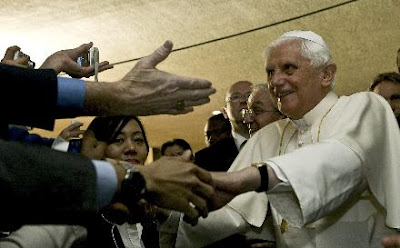
Benedict XVI greets people at the UN: photo by Jeff Zelevansky, Associated Press
On Friday, Benedict XVI addressed the General Assembly of the United Nations which is observing the sixtieth anniversary of the Universal Declaration of Human Rights. The pope reminded that "This document was the outcome of a convergence of different religious and cultural traditions, all of them motivated by the common desire to place the human person at the heart of institutions, laws and the workings of society, and to consider the human person essential for the world of culture, religion and science."
Of all his addresses over the course of the apostolic visit, I found this one to be the least accessible which not a critique of the speech but rather a statement about my lack of familiarity with the issues involved. (Perhaps some readers can bring more expertise to understanding this stop on the papal visit.) Human rights, of course, is the heart of the matter here and from my several readings of the text, I found this portion significant and, I think, consonant with the pope's thrust here. Once again, Whispers in the Loggia has the complete text.
Human rights, of course, must include the right to religious freedom, understood as the expression of a dimension that is at once individual and communitarian – a vision that brings out the unity of the person while clearly distinguishing between the dimension of the citizen and that of the believer. The activity of the United Nations in recent years has ensured that public debate gives space to viewpoints inspired by a religious vision in all its dimensions, including ritual, worship, education, dissemination of information and the freedom to profess and choose religion. It is inconceivable, then, that believers should have to suppress a part of themselves – their faith – in order to be active citizens. It should never be necessary to deny God in order to enjoy one’s rights. The rights associated with religion are all the more in need of protection if they are considered to clash with a prevailing secular ideology or with majority religious positions of an exclusive nature. The full guarantee of religious liberty cannot be limited to the free exercise of worship, but has to give due consideration to the public dimension of religion, and hence to the possibility of believers playing their part in building the social order. Indeed, they actually do so, for example through their influential and generous involvement in a vast network of initiatives which extend from Universities, scientific institutions and schools to health care agencies and charitable organizations in the service of the poorest and most marginalized. Refusal to recognize the contribution to society that is rooted in the religious dimension and in the quest for the Absolute – by its nature, expressing communion between persons – would effectively privilege an individualistic approach, and would fragment the unity of the person.






No comments:
Post a Comment
Please THINK before you write
and PRAY before you think!